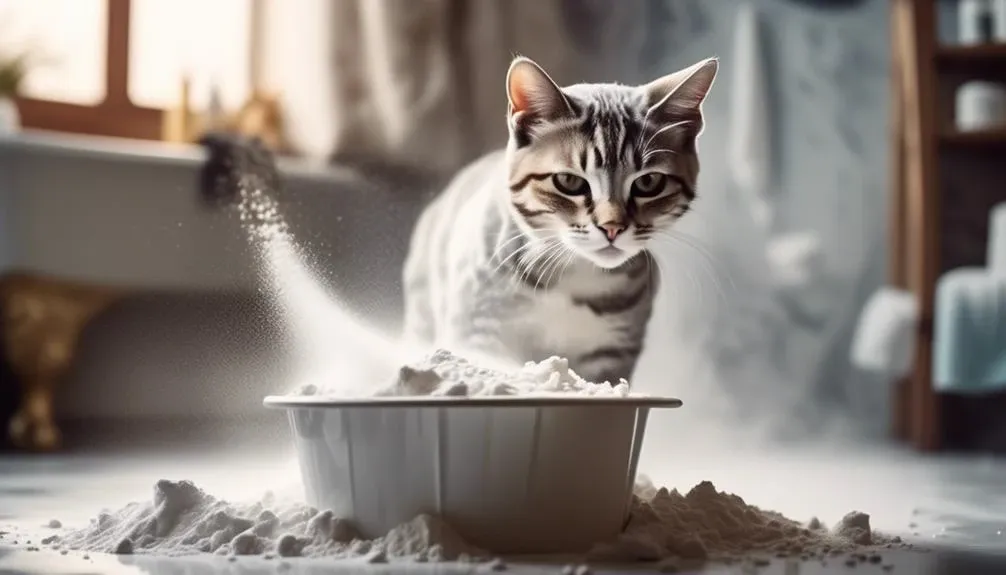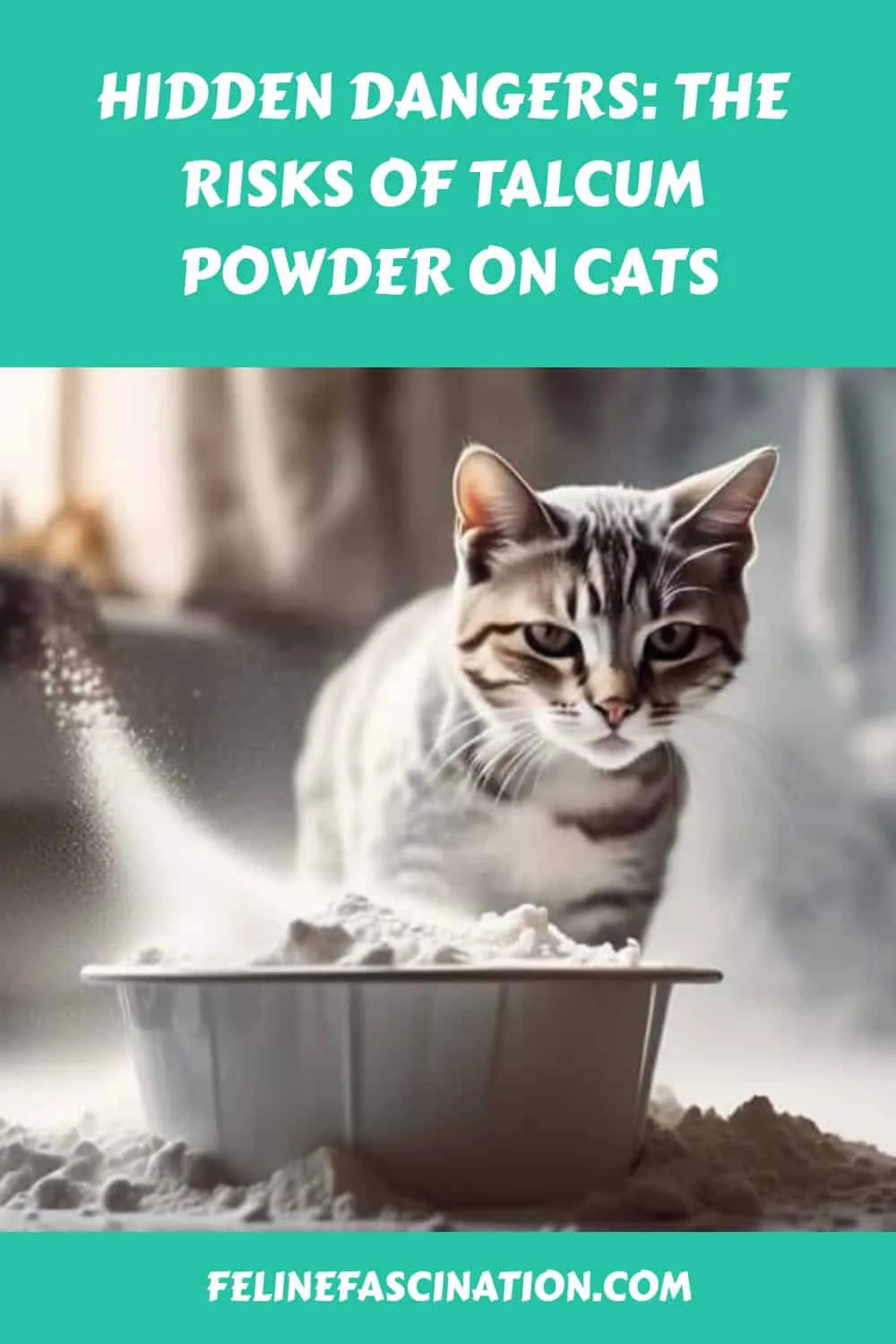The Best Fluffy Pancakes recipe you will fall in love with. Full of tips and tricks to help you make the best pancakes.

Talcum powder, a seemingly innocuous household product, has found its way into the lives of many pet owners, particularly those with cats, who rely on its deodorizing and moisture-wicking properties.
However, recent concerns have cast a shadow over its safety, raising questions about the potential risks it poses to our feline companions. In this article, we will delve into the hidden dangers of talcum powder on cats, examining its link to cancer, the uncertain risks of tumors, and the respiratory and ingestion hazards it presents.
Furthermore, we will explore the current use and availability of talcum powder, while also offering safer alternatives to ensure the well-being of our beloved cats.
Key Takeaways
- Talcum powder should not be used on cats as it can cause respiratory issues when inhaled and pose risks if ingested.
- Symptoms of talcum powder inhalation or ingestion in cats include trouble breathing, coughing, vomiting, and kidney or bladder issues.
- Johnson & Johnson discontinued selling talc-containing baby powder in 2020, but talcum powder may still be available for sale online or in stores.
- Safe alternatives to baby powder for cats include detangling sprays, specialized tools for mat removal, topical treatments or flea and tick shampoos for parasite control, and deodorizing sprays. Cornstarch powder can also be used, but caution must be taken to prevent inhalation.
The Link to Cancer: Talc and Asbestos
The link between talc and asbestos has been a subject of concern due to their potential association with cancer. Talc, a mineral used in talcum powder, has been found to contain asbestos, which is known to cause certain forms of lung cancer when inhaled by humans.
Studies have also suggested a potential risk of ovarian cancer in women who use talcum powder on their genitals. However, it is important to note that the evidence regarding talcum powder and cancer is not definitive. While some studies have shown an increased risk, others have not provided conclusive proof.
Additionally, talcum powder without asbestos may still have the potential to cause tumors, but further research is needed to confirm these findings.
It is crucial for individuals to be aware of these potential risks and make informed decisions regarding the use of talcum powder.
Uncertain Risks: Talcum Powder and Tumors
Research on the potential link between talcum powder and tumors remains inconclusive and requires further investigation. Conflicting research has been conducted on the potential health effects of talcum powder use, particularly in relation to tumor development.
While some studies have suggested a potential association between talcum powder use and certain types of tumors, such as ovarian cancer, others have found no significant evidence to support this claim. Animal studies have also yielded inconsistent results, with some animals developing tumors after exposure to talcum powder, while others did not.
Due to these conflicting findings, it is essential to continue researching the potential risks of talcum powder on tumor development to determine a clearer understanding of its effects on human and animal health.
Respiratory and Ingestion Risks in Cats
Inhalation and ingestion of talcum powder pose significant respiratory and digestive risks to cats. When cats inhale talcum powder, it can enter their lungs and cause respiratory issues such as wheezing, coughing, and trouble breathing. Ingesting talcum powder can lead to symptoms like loss of appetite, weight loss, vomiting, diarrhea, lethargy, and kidney or bladder issues.
If a cat exhibits these symptoms after exposure to talcum powder, immediate veterinary attention is necessary. Treatment for talcum powder poisoning in cats may include supportive care, such as intravenous fluids and medications to alleviate symptoms.
The long-term effects of talcum powder on cat health are not well-documented, but it is important to prioritize the safety of our feline companions and avoid exposing them to potential risks.
Current Use and Availability of Talcum Powder
Talcum powder is currently still available for purchase online or in stores, despite concerns about its potential risks.
The safety concerns with talc-based products primarily revolve around their impact on human health. Talc has been linked to cancer, particularly forms that contain asbestos. Although talcum powder without asbestos may still be capable of causing tumors, studies have not provided definitive proof.
In 2020, Johnson & Johnson discontinued selling talc-containing baby powder, even though it did not contain asbestos. Today, talcum powder is primarily made of cornstarch, which is considered safe to use on cats. However, it is important to read product ingredients carefully, as talcum powder may still be available for sale.
Considering the potential risks, it is advisable to explore alternative products for cats such as detangling sprays, flea treatments, and deodorizing sprays.
Safer Alternatives to Talcum Powder for Cats
Given the potential risks associated with using talcum powder on cats, it is important to explore safer alternatives for grooming and deodorizing our feline companions.
Here are three safer alternatives to talcum powder:
- Detangling solutions: Instead of using talcum powder to detangle mats in your cat's fur, opt for detangling sprays specifically formulated for pets. These sprays help loosen knots and mats, making it easier to groom your cat without the need for potentially harmful powders.
- Flea treatments: Talcum powder is not an effective flea treatment for cats. Consult with your veterinarian for safe and effective flea treatments, such as topical treatments or flea and tick shampoos. These products are specifically designed to eliminate fleas and other parasites without posing any risks to your cat's health.
- Cornstarch powder: If you still prefer using a powder for deodorizing purposes, cornstarch powder is a safer alternative to talcum powder. However, be cautious to prevent your cat from inhaling the powder by applying it sparingly and avoiding the face area.
Conclusion
In conclusion, the use of talcum powder on cats poses significant risks to their respiratory system and potential ingestion during grooming.
The presence of asbestos in talc has been linked to cancer, particularly lung cancer when inhaled. While the risks of talcum powder without asbestos remain uncertain, it is strongly advised against using baby powder on cats.
It is crucial for cat owners to explore safer alternatives to ensure the well-being of their feline companions. Remember, when it comes to talcum powder and cats, caution is key.










